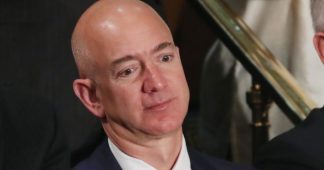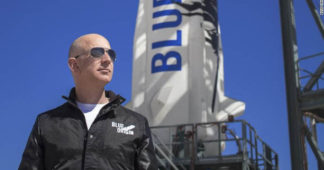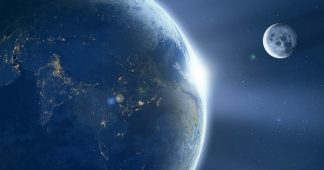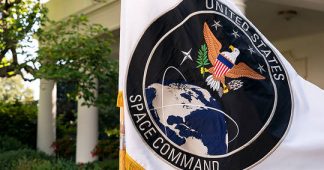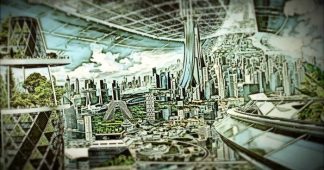One of the First Things Bezos Says After Returning From Space: Humanity Should Pollute It
By Jake Johnson
Just minutes after touching down following his successful and brief suborbital flight on Tuesday, billionaire Jeff Bezos expressed hope that humankind will ultimately develop the capacity to move the industries that have heavily polluted and warmed the Earth into space—a vision that one critic slammed as “delusional, toxic nonsense.”
Speaking to MSNBC host Stephanie Ruhle in one of his first interviews after the flight, Bezos—the richest person on Earth—said that “you can’t imagine how thin the atmosphere is when you see it from space.”
“We live in it and it looks so big. It feels like, you know, this atmosphere is huge and we can disregard it and treat it poorly,” Bezos said. “When you get up there and you see it, you see how tiny it is and how fragile it is. We need to take all heavy industry, all polluting industry, and move it into space, and keep Earth as this beautiful gem of a planet that it is.”
“Now that’s going to take decades and decades to achieve, but you have to start. And big things start with small steps,” Bezos said, characterizing Tuesday’s flight as part of a “tourism mission” that he believes will ultimately pave a “road to space” for future generations.
Blue Origin, the Bezos-funded company behind the unpiloted rocket and capsule that took the billionaire and several other passengers to space, reportedly plans to charge around $300,000 per seat for future commercial space flights
"We have to build a road to space so that our kids and their kids can build a future," Jeff Bezos tells @Sruhle on the Blue Origin space flight. pic.twitter.com/XKfV9UCb7X
— MSNBC (@MSNBC) July 20, 2021
As The Guardian reported Monday, the space tourism industry that Bezos hopes to usher in could have significant negative consequences for Earth’s climate—an impact that would run counter to the billionaire’s soaring rhetoric about the need to protect the planet.
“One rocket launch produces up to 300 tons of carbon dioxide into the upper atmosphere, where it can remain for years,” The Guardian noted.
In an analysis of research on space launch emissions, Jessica Dallas of the New Zealand Space Agency wrote that “while there are a number of environmental impacts resulting from the launch of space vehicles, the depletion of stratospheric ozone is the most studied and most immediately concerning.”
Jeff Bezos says the earth is “fragile.”
We didn’t need to go to space to know that. Let’s tax the wealthy to invest in green infrastructure and protecting our environment. https://t.co/hv4DsWsgnT
— Congressional Progressive Caucus Center (@WeBuildProgress) July 20, 2021
Progressive observers viewed Bezos’ foray into space—which came just a week after billionaire Richard Branson’s similar venture—as an obscene product of a system that has allowed a select few to accumulate vast wealth while people across the globe struggle to survive without adequate food, medicine, and shelter.
According to an Oxfam analysis, 11 people likely died of hunger every minute that Bezos spent on his expensive rocket.
“We’ve now reached stratospheric inequality. Billionaires burning into space, away from a world of pandemic, climate change, and starvation,” Oxfam’s Deepak Xavier said in a statement Monday. “What we need is a fair tax system that allows more investment into ending hunger and poverty, into education and healthcare, and into saving the planet from the growing climate crisis―rather than leaving it.”
Published at www.commondreams.org
